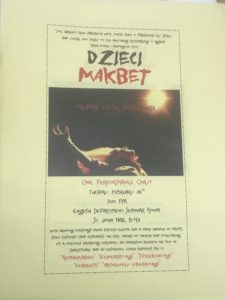At the close of a gloriously fast and emotionally powerful ninety minute performance of Makbet-in-the-seminar room yesterday on the St. John’s campus, all five of Dzieci Theatre‘s actors took hands in a circle. “Peace,” each said to the next. “Peace,” to the students and me gathered closely around. “Peace.” The props that had carried the story — Makbet’s hat, Macduff’s scarf, the grey coat of monarchy, Banquo’s beret — descended one by one into the gleaming steel pot.

Then — smash! — the lid crashed suddenly down. “The charm’s wound up!” And reality flooded the room, with the flick of incandescent lights. What a show!
That last gesture of clamping down tight on the symbols that had carried the roles during performance captured for me the heart of the Makbet experience. The show’s core overflows with sudden surprises and emotional compression. We didn’t expect it, even though we knew the end was near — and then the smash locked everything into place. I felt that gripping force often during the performance — as the battle scene rattled the bookshelves and shook the door, during the musical refrains, partly inspired, I learned later, by the amazing Song of the Goat company from Poland that I saw in New Haven a few years ago. The wrench of emotional compression slid around the room as the parts and props switched hands. Having seen the show once before, I looked for the spaces between the roles, trying to spot how kings and ladies and murderers and thanes came to be who they were.
The Dziecis very generously talked with us for twenty minutes after, and I could not have been more proud of how the students’ questions got at the heart of the matter, into the forces and pressures of the event.
The question I bit my tongue before asking — since my rule for any guest speakers on campus is that profs should not speak if students are willing to — was about a missing line from early in the play. It’s one of my favorites, an image of human struggle in a hostile environment:
Doubtful it stood
As two spent swimmers, that do cling together
And choke their art (1.2)
I see so much of Shakespeare’s play in that image, from the painful intimacy of the marriage to the windpipe-stifling competition of violent masculinity. The image also fixes the play’s blue or oceanic register, the alien depths it sometimes plumbs.
But in truth, as is almost always the cast with stripped-down Shakespeare productions, I don’t miss any words if the feelings are there. And I’ve rarely if ever seen a more feeling-ful Macbeth than the one the Dziecis create through their urgent, shared game of risk and community. I’m already wondering when I can see them perform the show again!
The company’s next production is an Easter passion, performed in several locations in the New York area from Palm Sunday through Easter. I’m not sure I can make it — my Easter will split itself between the Shakespeare Association Conference in DC and being home in my little beach neighborhood in CT — but I’d like to. They are a group worth keeping an eye on.
Such a treat to have Makbet fill up our little seminar room and transform it into regicide, poetry, magic, and reaching for things you can’t quite grasp!